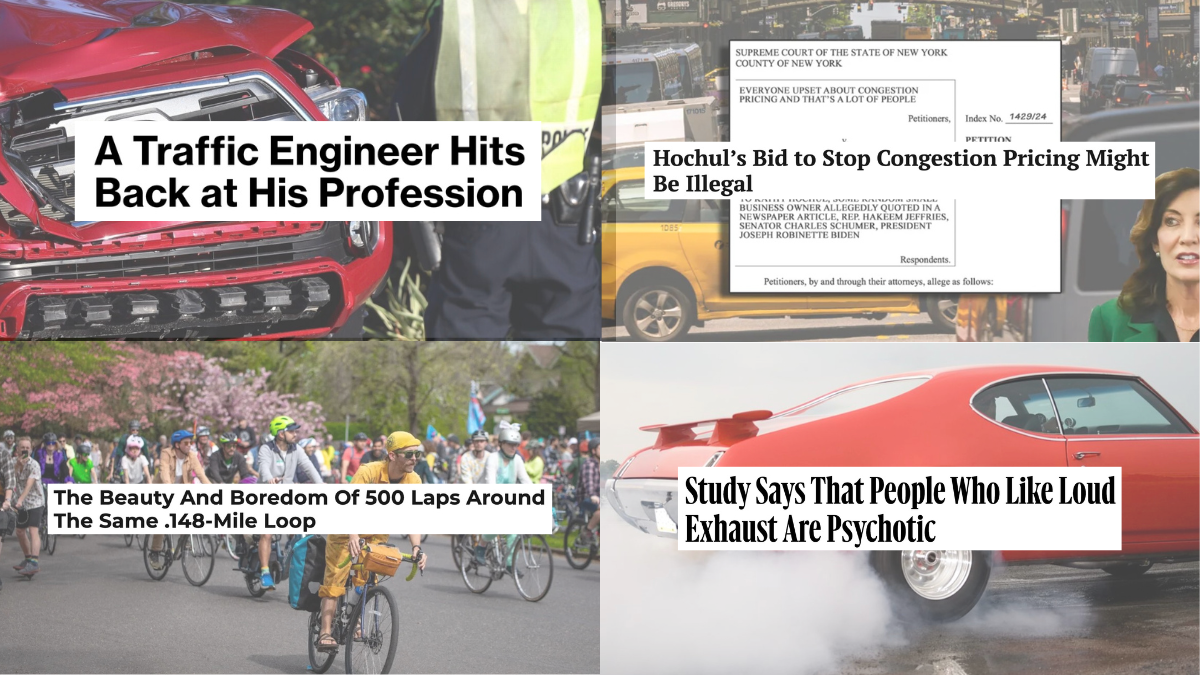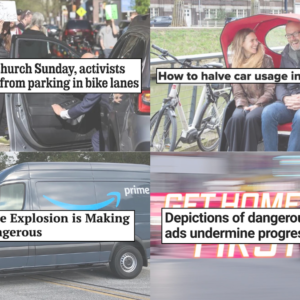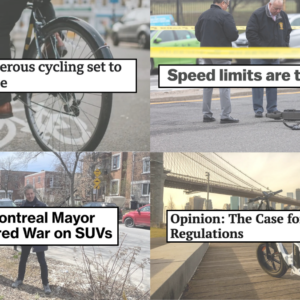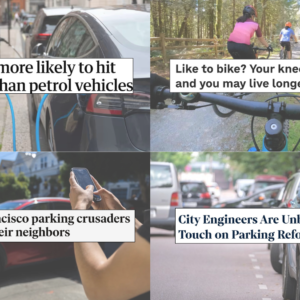Welcome to the week.
Let’s start things off with a recap of the best stories our community came across in the past seven days…
**This week’s Roundup is sponsored by The eBike Store, where e-MTB season has begun.**
Oh Hochul: New York Governor Kathy Hochul caved on congestion pricing and she might have cratered her political career as a result. It’s the biggest political blunder I’ve ever seen in the transportation space — and the latest reports say she might need to update her infamous video to say it’s back on again. (Streetsblog NYC)
Engineering death: A former traffic engineer has written a tell-all about his former profession that lifts the veil on how design decisions are made and reads like a plea for reform. (Bloomberg)
Kids these days: The “throttle kids” phenomenon we covered two years ago has made it into a national news outlet as the trend of kids hopping on e-bikes instead of cars is alive and well. (Wall St. Journal)
Ladds 500 paean: A beautifully captured report on last April’s Ladds 500 event was well worth the wait. (Defector)
Blumenauer’s e-bike gambit: Excellent context on the bill announced by Portland Congressman Earl Blumenauer last week that aims to boost competitiveness of American electric bike manufacturing. (The Verge)
Heavy pedals: City of San Francisco employees are speeding all over the city, according to records dug up by a local news outlet that examined logs of the city’s vehicle fleet. (San Francisco Standard)
Decibel dudes: Talk about validating my feelings about people who love making absurdly loud noises with their car (or motorcycle) exhaust! This study found guys who do this (and they’re almost always guys) are often sadistic, psychotic creeps. (Car and Driver)
Power of bicycles: No big deal, just a story from a major city in Pakistan where women are building community and power by riding bicycles together. (Dawn)
Don’t overlook education: Teaching people — especially women and underserved groups — how to be confident on a bike and to integrate cycling into their lifestyle can help cities save themselves and reach cycling mode split goals. (Bloomberg)
Ride style: What should we make of the fact that one of the largest retailers of fast fashion in the world, H&M, delves into performance cycling apparel? (Global Cycling Network)
“Age means nothing”: An inspirational tale from the recent Unbound gravel cycling race where a 73-year old rider not only finished but crushed the course. (Cycling Weekly)
Thanks to everyone who sent in links this week. The Monday Roundup is a community effort, so please feel free to send us any great stories you come across.









Thanks for reading.
BikePortland has served this community with independent community journalism since 2005. We rely on subscriptions from readers like you to survive. Your financial support is vital in keeping this valuable resource alive and well.
Please subscribe today to strengthen and expand our work.
I’d be interested if you could expand on why you think Hochul may have cratered her career by reversing herself on congestion pricing. Everything I’ve read makes me think the plan was quite unpopular, and many pundits have suggested the reversal had everything to do with improving the electoral prospects of Democrats in November.
Why do you think this move was a political blunder?
It is unpopular among loud pundits from New Jersey and Long Island. Most New Yorkers support it (from what I’ve seen – especially those in Manhattan, Brooklyn, and the Bronx).
It’s also extremely obvious that there was no plan B from Hochul and her team. They floated a payroll tax increase that immediately died in the legislature, and the legislature refused to give a blank check of general fund dollars. I just read that this might tank the MTAs bond rating. It’s also debatable that this is not within Hocul’s authority – given that the legislature has already approved the policy and that the MTA has a nominally independent board with a fiduciary responsibility not to tank a $15B plan that is about to be implemented on the political whims of the Hochul, Hakeem Jefferies, and Chuck Schumer. At minimum, it’s grossly negligent. People tend to not like grossly negligent politicians
Arguably, the fiduciary responsibility of the independent board of a transit agency is to provide a service with the funds currently being received, not mismanage it to such an extent that politicians must go looking under every cushion for dollars to maintain awful service in the hope they win the lottery and can actually improve things.
No one with fiduciary responsibility would favor tanking a plan that brings in $1B yearly – plus all the federal matching funds. I wouldn’t disagree that serious changes need to be made to the MTA to get costs down (why are the LIRR and Metro North so separate for example), but the finer points of governance of a transit agency aren’t really the point here. All of those are things that can be done regardless of congestion pricing
The polling in NYC is 64-36 against this. It’s very unpopular.
She handled it terrible but those numbers are so bad she had to.
The political fallout is hurting Dems upstate also.
That’s the polling statewide – surely way different than in the city itself (particularly the transit dependent parts)
Sorry why should upstate Dems even care about this? Seems a bit like if Eastern Oregonians were up in arms about tolling in Portland.
The article I got data from also gave an instructive example of how things shook out in Stockholm with support growing quickly after implementing actually showed traffic improvements. https://www.cityandstateny.com/policy/2024/05/congestion-pricing-probably-month-away-new-york-city-ready/396787/
This is not what I’ve read. About 2/3 of New Yorkers are opposed to the plan, and over 70% of those in the suburbs.
Since Hochul appointed a number of congestion pricing supporters to the MTA board, and they’ll make the final decision, it may yet move forward. Also, it is possible that, if the pause is motivated by electoral concerns, it will be back after the election.
I wouldn’t count it out just yet.
https://abc7ny.com/nyc-congestion-pricing-nearly-two-thirds-of-new-yorkers-oppose-plan-siena-college-poll-finds/14721916/
That’s a statewide poll. Sort of irrelevant in my opinion – like it’s politically relevant because of the governance structure of the MTA but I just don’t care what people in Buffalo, Albany, or Rochester think about this policy.
Congestion pricing is always unpopular before it’s implemented, and tends to be popular after. (https://www.cityandstateny.com/policy/2024/05/congestion-pricing-probably-month-away-new-york-city-ready/396787/)
“That’s a statewide poll.”
Hochul is a statewide politician, so those are her constituents.
Statewide sentiment is also important if you are considering November election.
So while you may not care but people in other parts of New York think, Hochul clearly does.
Again, I’m not saying she should have canceled it, I am saying that giving her political concerns, it may not have been the blunder it was perported to be.
Sure, but it’s sort of a bad look to cancel a project in one part of a state based on what people in a different part of the state feel about it. Especially considering the stage in the process congestion pricing is in (already paid $500M to roll out, studied forever, based by the state leg, etc.). Also, you were (seemingly) not referencing it as a statewide poll in your own comment.
And I dunno, chasing the vote of a person who doesn’t live in New York [City] and is likely barely affected by congestion pricing by cancelling congestion pricing is kind of bad politics if you ask me. Especially in the context of how the existing MTA capital plan is still something that needs to be paid for! If congestion pricing doesn’t go through, and the MTA has to raid the general fund for the Second Avenue Subway extension (yes I know it has a ridiculous pricetag, and could be done way cheaper – different issue), then that’s money that will come out of somewhere. Cuts to services elsewhere is bad, and the projects the MTA are pursuing are (mostly) good. This is pretty good way to pay for it, especially since New York is a place where there are genuine options other than driving! She should be saying stuff like this – rather than undermining critical revenue policy at a key moment. That is horrid governance on so so many levels
People who live in the NYC area refer to the city as “the City,” not as New York, which usually means the state. You can say Manhattan, or write NYC, otherwise I keep having trouble knowing what you all are talking about.
Hochul has obviously concluded that critical electoral politics are more important (and with Trump on the ballot and the balance in congress and the statehouse at stake, I can at least understand that viewpoint). We know she likes congestion pricing in general (based on what she’s said and who she’s appointed to the MTA board), which is why I think it may be back later.
You say this is bad politics, but I have to say I respect her judgement more. She is in the thick of it, and she is, frankly an expert with a lot on the line. And are those frustrated NYC residents going to vote for Republicans? Annoyed suburbanites, who largely hate this project, might.
[Edited to say NYC residents instead of New Yorkers out of deference to Lisa]
The poll you cite is of New York State registered voters. Important to distinguish between city and state when using “New Yorker.”
The poll is broken out by region. In New York City the opposition is 64%. In the suburbs it is even higher at 72%. Yet statewide 52%. So much for assumptions….
https://scri.siena.edu/wp-content/uploads/2024/04/Final-SNY0424-Crosstabs.pdf
This polling gives you an idea of the support this had when they launched the effort, and will show you the huge delta between NY state and NY City voters:
https://nyc.streetsblog.org/2019/01/17/poll-city-support-for-congestion-pricing-is-even-stronger-than-statewide
I do believe this plan is more popular among residents of NYC than those outside the city. The fact remains that the plan needed the approval of the governor, and Hochul’s career depends on the opinions of New Yorkers statewide.
Pausing (or canceling, if that’s how this turns out) is exactly what a very solid majority of her constituents want. It seems unlikely that this will crater her career.
Ironically, Mayor Adams, who’s career depends on the opinion of New Yorkers is opposed to the plan.
If I’m not mistaken, Hochul has indefinitely postposed the initiation of congestion pricing in New York City.
One wonders why the whims of a Buffalo resident would hold as much sway as the opinion of a Brooklynite on this specific issue.
But if they do, and we can translate this topic to a current local transportation project, does that mean that a resident of Portland who lives west of Cesar E Chavez Boulevard can have an equal say in the configuration of lanes on 82nd Avenue? Or is there a boundary where one is considered a stakeholder with more authority? If so, how many blocks from 82nd until the opinion can be disregarded?
That’s my understanding as well.
A Buffalo resident is important to Hochul because while they have the same vote for her as a NYC resident, they are far more prone to elect a Republican to the House (and to the state legislature) if they are miffed than residents of NYC. I’m sure you can understand why Hochul would see that as a negative outcome.
I don’t think a Buffalo resident that rarely travels to NYC should have a voice in NYC congestion pricing, but they evidently do. I didn’t create the system, and I have no voice in changing it, so my opinion on how it should work doesn’t matter a whole lot.
PS Thank you. I truly appreciate that you’ve been paying attention to what I write 🙂
Simple, it is in violation of the narrative written by transportation wonks that would have given precedent to force feed this program down the throats of every city with ambitions of being like NYC even in the worst ways, the middle class be damned.
Given the estimate of the contribution to the transit budget from this, the existing transit fiscal nightmare and the about face from Hochul, this must have been polling very poorly recently.
It’s fiscally and environmentally irresponsible in a state that is overwhelmingly Democratic. The MTA already paid to implement congestion pricing and now Hochul’s action caused a huge budget hole that will prevent long overdue upgrades from being implemented anytime soon. It will also set the rest of the country back on congestion pricing because now the opposition has a loud “But NYC couldn’t even do it!” argument.
“long overdue upgrades” you say. These will be mostly upgrades to car capacity, or the bureaucracies that focus on keeping motor vehicles moving, with a few bones thrown to the active transportation advocates, who are so starved for sensible transportation, that they froth at the mouth for more revenue. Congestion pricing = more revenue = bigger oil bureaucrats = more of the sorry same.
This is just patently false. Tons of this money is for ADA retrofits and signaling upgrades on the subway, along with the Second Ave extension. Have you read the plan at all, or are you just assuming/guessing?
Everything you say may be true, but it may still be a smart choice politically.
I was questioning the assessment that this one of the biggest transportation political blunders, and will tank Hochul’s career as a result, as JM asserted. That declaration is much different than what I’ve read elsewhere, and I am interested to learn how JM arrived at it his conclusion.
“We shouldn’t think that fixing congestion is going to solve our economic problems. All the cities that have solved congestion have only done so because it’s a city where nobody wants to be.”
A breath of relief hearing this from a (former) traffic engineer.
This article and the one on educating people to ride bikes reminds me of how many motorists are truly terrified about learning to bicycling in traffic, any amount of traffic. I grew up not knowing how to drive in ND (still don’t), so biking in traffic has always been a necessity for me. I’ll grant you some stroads are worse than others, but that has never stopped me from getting to where I need to go (Interstates by bike aren’t as bad as you might think), but every time I discuss bicycling in traffic in my loser city that literally has no traffic congestion and only a 20-minute rush hour (pop 300,000), it terrifies my doctor, dentist, and everyone else who I know who only bike on park paths they drive out to.
Something I just thought of, cycling in traffic was scary for me at first. Not being sure where I’m supposed to go, is someone going to immediately hit me, etc. But eventually I got used to it. I still don’t like riding on the highway, anywhere there is a huge speed difference. But anywhere in town feels fine now.
What I realized is, that’s how it felt driving at first too! I remember when I first started being the one in control of that car. All the things to pay attention to (poorly) and so many fast moving vehicles and people walking and lights turning. I remember taking routes that specifically avoided freeways because it was intimidating to take an onramp into fast moving traffic. I stuck to side roads and country roads (sounds like cycling!).
My point being, driving is also scary! But society tells you it’s normal, you do it for a few months, and then you get used to it. It’s mostly desensitization to the dangers that makes either one feel normal. And months of doing it without dying. If people like you (and all of us) keep leading by example and telling our suburbanite dentists about it, that’s one of the things we can do to get people riding. Obviously not sufficient, but probably necessary.
Yes, awesome John V! Risk perception is one of the main factors in how people bike and use autos. This is why engineers remove “clear zones” for visibility (e.g., trees), expand the width of highways, reduce curves etc. which result in people feeling more safe at higher speeds. This is how the 80th percentile rule is applied to determine speeds. The reverse is also true. When engineers narrow streets, add trees to obscure the view etc. this causes drivers to feel less safe reducing travel speeds. This is also why simply putting up a sign with a number and mph is nearly worthless compared to redesigning a street.
I’m not sure how much driver behavior is affected by the overt “normalisation” of behavior by simply being told x is safe. But there is a lot of evidence how street design affects driver behavior. Unfortunately, engineers are often still using a lot of the lessons learned over the last century to make highways safer by improperly applying them to urban streets (and deviating from those terrible design standards baked into the MUTCD can lead to litigation so they may often be stuck doing it anyway).
Scores on multidimensional psychometric surveys of “dark” traits have been criticized on both methodological and interpretive grounds (10.1177/0963721419838233) so any results should be placed in context of the wider literature which both the author of the linked article and the blog owner fail to do. Despite the fact that these dimensional scores do not in any way predict an individual’s behavior and are also in no way a clinical diagnosis, this blogpost author described study participants as “psychotic creeps”. I should also note that “psychotic” or psychopathy are no longer a diagnostic criterion according the APA (DSM-V) and that the use of this pejorative phrase for individuals based on a multivariate “dimensional” personality test score is not only pejorative nonsense but provides an example of how journalists often transform a single out-of-context scientific study into the worst kind of rage-bait.
wow good thing this isn’t a courtroom
I enjoyed reading the article’s pejorative nonsense after seeing Jonathan’s cavalierly-written description.
But thank you for the heads up that the Car and Driver columnist’s analysis of the sadistic, psychotic creeps is not equivalent to a professional diagnosis by a member of the American Psychiatric Association using the the Diagnostic and Statistical Manual of Mental Disorders (Fifth Edition).
Sadistic, psychotic creep was used only by the blog author, not by the dumb cage and driver rag. Describing people with cluster B disorders (who tend to score high along dimensions of dark triad/tetrad tests) as psychotic creeps is an example of ableism towards people with mental health disorders. Your defense of this ableism is noted.
If somebody’s neurodivergence causes them to terrorize their fellow citizens, I’m okay with being ableist against that person. We still live in a society.
The blog author referred to people who took a psychometric test as psychotic creeps so your comment does not address mine at all.
Your logic:
If a [minority] terrorize[s] their fellow citizens, I’m okay with being bigoted/racist against that person.
Those of us with mental health disorders are capable of advocating for ourselves and capable of understanding from context whether we’ve been insulted or not, thanks.
Hi Will, You don’t get to speak for me.
–A person with a mental health disorder
It seems clear that Will wasn’t speaking for you, based on what he wrote.
Clearly.
More ableism.
Back atcha bub.
Unless, of course, you’re not because of mental illness.
We have to accept that people have some responsibility for themselves and at the same time, are affected by things like mental illness that are kind of out of your control. Otherwise it doesn’t really mean anything to say someone has mental illness! If it didn’t affect you, it wouldn’t be a thing.
Your “reinterpretation” of my logic is the most illogical comment in this thread and I can’t be bothered to try to fix it for you.
I know that. I didn’t think, or imply, that that phrase was used by the Car and Driver author.
I also assumed Jonathan’ described the people as “creeps” because they thought positively of loud car exhaust noises, and/or modified their cars’ exhausts to make them loud, not because of the state of their mental health.
I have no problem with calling someone who drives in a dangerous or antagonistic manner a creep. Describing study participant as psychotic creeps because they score in particular way on a psychometric test on the other hand is pure ableism.
Why are you noting things? Is this going to be on our report cards?
Unlike Seattle, which is a nightmare labyrinth of cliffs looming over the Puget Sound, Portland is relatively flat.
😀 yes, relatively flat, Welcome to Portland, now get on your bicycle 😀
https://defector.com/the-beauty-and-boredom-of-500-laps-around-the-same-148-mile-loop
When I travel, I invariably bring my bike with me and discover first-hand just how hilly each city really is. Portland is relatively flat, as you say, particularly east and north of the Willamette River, a series of tablelands or terraces interspersed with 650-foot buttes; west of the river it gets pretty hilly indeed. Seattle is super hilly, as is SF, Pittsburgh, Genoa, Rome, & Lyon, as well as many smaller cities like Charlottesville VA, Winston-Salem NC, Durham NC, Albany NY, Siena, Namur, and Birmingham Alabama. Really flat cities include Houston, Philadelphia, Chicago, Milan, New Orleans, Amsterdam (and most other Dutch cities), Cambridge UK, New Haven CT, Bruges, Ghent, and many others. But most cities are moderately hilly, or flat with some hills, like DC, the Twin Cities, Charlotte, Atlanta, Vancouver BC, Eugene, Salem, Raleigh, and so on.
It’s like the old adage – Portland is flat, except where it isn’t
Great link to Ladds 500 article
Thanks
Corbin Smith, thank for your story on the Ladds. Very enjoyable read.
Rode by the shot up cameras today and it looks like the shooter is a very good shot (scary). Three shots all pretty much perfect
Not really. He was shooting these basically point-blank. Not hard to hit a target that large from just a few feet away.
thanks for sharing this Jesse. Hope you don’t mind me using it in a story Wednesday morning.
Would love to read the Bloomberg article but it appears paywalled. Did buy the book, so Lisa can review it when I’m done! 🙂
The WSJ throttle kids article is behind a paywall.
But I think it worth pointing out that the relationship between e-bikes and regular bikes is in important respects the inverse of the relationship between e-cars and regular cars.
Notwithstanding foolish claims about e-bikes having a lower environmental footprint than regular bikes it seems quite clear that a regular bike is pretty much the pinnacle of low-impact mobility. It is hard to think of anything with less impact. So the ebike’s upstream material requirements and the material requirements to supply the juice both represent *additional burdens* over and above the regular bike. Fussier components with hotter product lives on e-bikes only compound this imbalance.
The opposite is I think true for e-cars. They may turn out to have lower environmental footprint than their fossil-fuel powered cousins. I am not an expert on measuring these differences but am willing to grant that an e-car could represent a smaller burden than the car-car.
So when we talk about e-stuff, we should be mindful of what it is we are comparing these products to.
A throttle e-bike is essentially a lightweight, cheap, slow e-car with only 2 wheels. And different political baggage.
You would say such a thing.
No more so than a moped is all of those things. And yet this side of Bangkok you don’t see folks who drive/drove cars flocking to buy and ride mopeds.
Is there evidence that some people in Bangkok switched from cars, as opposed to switching from walking or biking, to mopeds?
In Portland at least a few people that I know are switching from cars to e-bikes. I hope that people are also switching to e-bikes from mopeds because those things are really foul.
I think the important comparison for e-bikes is with any car: 2 percent of the raw materials, 2 percent of the tire waste killing coho salmon, a lot less hazard to pedestrians, less noise, less financing, better throughput on roads, etc etc.
I was responding to Watts’ blithe remark about e-bikes being essentially an e-car with two wheels. This is so reductive and absurd. People choose cars over other modes (skate boards, mopeds, bikes, roller blades, feet, dozers, donkeys) for a hundred reasons, only a few of which have to do with the fact that the forward motion is supplied by something other than muscle power. If the automism of the throttle were all it took to inspire people we would see more vehicular diversity.
“In Portland at least a few people that I know are switching from cars to e-bikes.”
I’m sure you are correct, but as I’ve said before I think it is important when making such claims to differentiate between (a) he-she now sometimes takes an e-bike where he/she would have driven the car before, and (b) he/she sold the car because he/she now rides an e-bike.
(b) exists
I assume so too.
But my fear is that the vanishingly small number of cases of (b) are treated as general cases allowing our view of the matter to slip into territory wholly unjustified by the statistically unrepresentative incidence of (b).
If I am wrong about this and more than a handful of cases of (b) can be found then let’s hear about them, interview them, learn all we can about the joys and challenges of swapping the car for the ebike. But in the absence of this (and I have been inviting such inquiry for most of a decade here in these pages) I am loath to assume it is common much less representative.
Except the electric part.
I would argue that a electric moped is not so different from a e-bike. Which is exactly the kind of thing I’d say.
And an airliner is essentially a bicycle with wings, an engine, and gas turbines.
Everything is everything else if you can change all the relevant details!
My point is to tease out what the relevant details are. Most of us take these categories as fixed and immutable, but the landscape is changing quickly.
What makes a car so hated? It used to be that it was mechanized, as opposed to a bike. Now we have large, heavy, electrified cargo bikes/trikes and light electric motorcycles that seem to occupy intermediate roles, blurring the lines a bit.
I think some of the distinction on the edges is cultural, not categorical, and the question is going to become more relevant as people keep building more and more intermediate vehicles, such as the Arcimoto.
https://www.youtube.com/watch?v=ZJrJE0r4NkU&t=26s
Continuing to psychoanalyze e-bikes and what they are or aren’t or who rides them or who doesn’t, though entertaining in these forums isn’t going to change anything.
You (anyone) that has an issue with e-bikes and how they are currently defined by state law needs to take it up with their state legislature and get laws changed.
But hey, I do enjoy the back and forth, it is very entertaining, even if non-constructive!
“entertaining in these forums isn’t going to change anything.”
I don’t understand your response.
Wouldn’t the same be true for most any point made here on bikeportland? We, most of us, are just little people having a conversation. Why is this idea that ‘it won’t change anything’ all important?
Education: Also doesn’t ipso facto ‘change anything,’ but we still do it, and some people even think it valuable.
Furthermore how can you be so certain that it won’t change anything?
Once, many years ago, I introduced Emily Finch to Jonathan Maus. The article Jonathan wrote about her, and the resulting comments were, at the time, the biggest thing that had hit bikeportland (at least that is how I remember it). You don’t always know what silly thing, idea, notion will make a big splash.